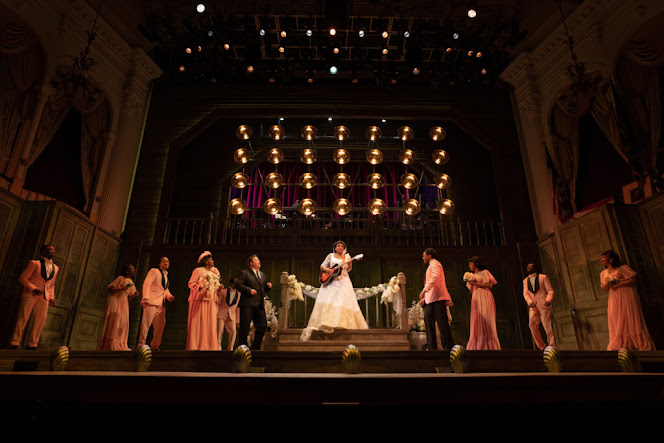Shout Sister Shout!, Ford's Theatre, Washington, DC
Carrie Compere as Sister Rosetta Tharpe (center) with the cast of Shout Sister Shout! Photo credit: Andre Chung.
It is a rare event when I attend a performance of a play I know nothing (or almost nothing) about. (I wish I had kept a running list over the years of all of the performances I have been fortunate enough to see.)
Such is the case, however, with the current production at
Ford’s Thatre: Shout Sister Shout! (Every reference to the play in the
program is written without commas, and in all CAPS as well. My inner grammarian
grimaces.) Having scored a free ticket to the final preview performance through
TodayTix, I wasn’t about to miss this opportunity.
Shout Sister Shout! defies easy categorization. It is
a “jukebox musical,” in which the songs by a famous musician are assembled in a
way to tell the subject’s story (Jersey Boys, for example) or songs are
arranged to tell an invented story (Mamma Mia! is a good example).
Possibly the first (and maybe only) gospel-based jukebox musical, Shout Sister
Shout! falls into the first category, telling the fact-based story of
Sister Rosetta Tharpe (1915-1973). Sister Rosetta’s roots were in the Black
church and gospel music, but she “crossed over” to wider audiences by
incorporating elements of swing, jazz, blues, country, and rock and roll.
Playing her own guitar at a time when guitar-playing women were rare
(especially in gospel music!), Sister Rosetta influenced generations of
musicians, including Little Richard (who makes a brief appearance in the show),
Johnny Cash, and Elvis Presley, as well as Keith Richards, Eric Clapton, Aretha
Franklin, and Tina Turner. Sometimes referred to as “the godmother of rock and
roll,” she was posthumously inducted into the Rock and Roll Hall of Fame in
2018. Not being a connoisseur of gospel music, I had never heard of her. I
would soon learn plenty.
Cheryl L. West created the libretto for Shout Sister Shout!,
based on Gayle F. Wald’s 2007 biography, Shout, Sister, Shout! The Untold
Story of Rock-and-Roll Trailblazer Sister Rosetta Tharpe. The book also
served as the basis of the 2011 documentary film, “Sister Rosetta Tharpe:
Godmother of Rock.”
We first meet Sister Rosetta as a teen, playing guitar and
singing gospel with her evangelist mother. She marries a controlling minister
with violent tendencies, leaving him after a tense, threatening interchange.
Wooed by agents promising her a bright future in New York, she alters her form
of gospel and appears at the Cotton Club, among other more secular venues. Her
mother and others (including Mahalia Jackson, in a memorable encounter)
disapprove of her deviation from traditional gospel, but soon the money is
rolling in and she is in demand. She experiences an attraction to a beautiful
musician, Marie Knight, and they begin a personal and professional
relationship. When tragedy befalls Marie’s family, Sister Rosetta is left
alone. She reconciles with her mother and eventually agrees to a publicity
stunt in which she will marry her next husband at Washington’s Griffith
Stadium, with a paying audience of 25,000 in attendance. Later, she suffers a
stroke and has a leg amputated due to complications from diabetes. We last see
her, seated in her wheelchair, still singing her mother’s favorite, “Precious
Memories.”
Even though much of the action in the play is predictable
(of course the teenaged bride will marry a man who abuses her and of course she
and her mother will be at odds when it comes to her music, for example), that
is what actually happened.
Carrie Compere literally “takes us to church” as Sister
Rosetta. She fills the role with passion and a voice that soars with
spine-tingling intensity. Carol Dennis, as her mother, has a different energy,
but a similarly thrilling voice. The two of them not only fill the stage with
their presence, they have a mother-daughter dynamic that is honest and
believable. Felicia Boswell gives a heart-breaking performance as Sister
Rosetta’s partner, Marie.
Little Richard isn’t the only well-known figure whose path crosses with Sister Rosetta during the play: Cab Calloway, the Nicholas Brothers, Dizzy Gillespie, and Mahalia Jackson appear as well. Jamal Antony Shuriah is nimble and sincere as Little Richard. Kelli Blackwell is imperious and commanding as Mahalia Jackson, and although Keenan McCarter’s cheeks don’t quite match the real Dizzy Gillespie, his is a fine characterization and his trumpet-playing top notch as well. The entire ensemble is sharp and on point. Special mentions to Sinclair Mitchell, suitably menacing as Sister Rosetta’s abusive first husband, and Joe Mallon as Sister Rosetta’s fussy manager.
Kenneth L. Roberson serves as director and William Carlos Angulo as choreographer, keeping the show in focus and moving well. Sheilah V. Walker is musical director, with Victor Simonson conducting an 8-person orchestra, adapting styles as often as some of the musicians change instruments. Scenic designer Tim Mackabee gets ample mileage from the stage’s turntable, taking us to a variety of locales. Alejo Vietti designed the costumes, which range from the drably mundane to the glamorous. The production is supervised by Sheldon Epps.
If you are an aficionado of gospel music – or just
interested in seeing some raise-the-roof performances – I commend Shout
Sister Shout! to you, even missing the commas. The play continues through May 13.




Comments
Post a Comment